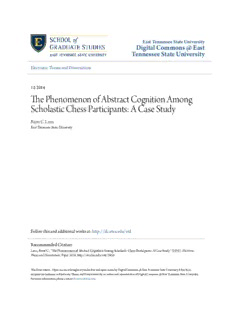
The Phenomenon of Abstract Cognition Among Scholastic Chess Participants PDF
Preview The Phenomenon of Abstract Cognition Among Scholastic Chess Participants
East Tennessee State University Digital Commons @ East Tennessee State University Electronic Theses and Dissertations Student Works 12-2014 The Phenomenon of Abstract Cognition Among Scholastic Chess Participants: A Case Study Brent C. Laws East Tennessee State University Follow this and additional works at:https://dc.etsu.edu/etd Part of theChild Psychology Commons,Cognition and Perception Commons,Cognitive Neuroscience Commons,Cognitive Psychology Commons,Developmental Psychology Commons, Educational Administration and Supervision Commons,Educational Assessment, Evaluation, and Research Commons,Educational Psychology Commons,Other Education Commons,Other Neuroscience and Neurobiology Commons,Other Psychology Commons, and theScience and Mathematics Education Commons Recommended Citation Laws, Brent C., "The Phenomenon of Abstract Cognition Among Scholastic Chess Participants: A Case Study" (2014).Electronic Theses and Dissertations.Paper 2458. https://dc.etsu.edu/etd/2458 This Dissertation - Open Access is brought to you for free and open access by the Student Works at Digital Commons @ East Tennessee State University. It has been accepted for inclusion in Electronic Theses and Dissertations by an authorized administrator of Digital Commons @ East Tennessee State University. For more information, please [email protected]. The Phenomenon of Abstract Cognition Among Scholastic Chess Participants: A Case Study ______________________ A dissertation presented to the faculty of the Department of Educational Leadership and Policy Analysis East Tennessee State University In partial fulfillment of the requirements for the degree Doctor of Education in Educational Leadership ______________________ by Brent Carlie James Laws December 2014 ______________________ Dr. Bill Flora, Chair Dr. Bethany Flora Dr. Richard Osborne Dr. Pamela Scott Keywords: Abstract cognition phenomena, Chess, Education, Piaget, Visual-spatial ability ABSTRACT The Phenomenon of Abstract Cognition Among Scholastic Chess Participants: A Case Study by Brent C. Laws A qualitative investigation was conducted to explore the phenomenon of abstract cognition among a purposive sample of 5 secondary scholastic chess club participants. The case study enabled the researcher to explore the faculties of abstract cognition among students of contrasting skills and abilities in playing chess. The study also allowed for the consideration of potential visual-spatial, logical, academic, social competency and life benefits of chess play. Through analysis of interviews, chess simulations, blindfold chess play, and narration of chess lines and sequences, the investigator was able to extract meaning and code schemata into a holistic understanding of the phenomenon of abstract cognition within the context of Piaget’s Formal Operations Stage. Scholastic chess systematically engages the student in a stimuli-enriched environment in which the participant must exercise optimal cognitive control in processing and anticipating chess lines and sequences, thus facilitating the manifestation and phenomenon of abstract cognition. Abstract cognition as a phenomenon may elicit increased academic, scholarly, and life potential. Participation in scholastic chess may produce both scholarly and critical thinking individuals. Suggestions for future research include continuing qualitative research in the area of abstract cognition among chess players and developing a stronger understanding of cognitive growth in students. 2 COPYRIGHT © 2014 BRENT C. LAWS ALL RIGHTS RESERVED 3 DEDICATION For C.J.L and J.H.L. Though much is taken, much abides; and though We are not now that strength which in old days Moved earth and heaven, that which we are, we are, One equal temper of heroic hearts, Made weak by time and fate, but strong in will To strive, to seek, to find, and not to yield. - ALFRED, LORD TENNYSON 4 ACKNOWLEDGEMENTS I would like to thank and acknowledge my parents for their love and support throughout my adventures in higher education. I would like to thank God for extending the branches of academic and professional opportunity. Lastly, I would like to thank and acknowledge my dissertation committee members, Dr. Bill Flora (Chair), Dr. Bethany Flora, Dr. Pam Scott, and Dr. Rick Osbourne, for their scholarly guidance with this investigation. 5 TABLE OF CONTENTS Page ABSTRACT ............................................................................................................................ 2 DEDICATION ........................................................................................................................ 4 ACKNOWLEDGMENTS ...................................................................................................... 5 LIST OF TABLES.................................................................................................................. 11 LIST OF FIGURES................................................................................................................ 12 Chapter 1. INTRODUCTION ............................................................................................................. 13 Statement of the Problem …………........................................................................... 13 Research Questions .................................................................................................... 16 Significance of the Study ........................................................................................... 17 Definitions of Terms ................................................................................................... 17 Limitations and Delimitations ..................................................................................... 18 Overview of the Study ................................................................................................ 20 2. REVIEW OF LITERATURE ............................................................................................. 21 Introduction................................................................................................................. 21 Chess Skill and Anticipating Outcomes..................................................................... 24 The Nature of Abstract Cognition.............................................................................. 26 Empirical Data Evidencing Specific Piagetian Tasks ................................................ 28 Visual-Spatial Ability and Abstract Conceptualization ............................................. 32 Blindfold Chess .......................................................................................................... 38 Summary..................................................................................................................... 41 6 Chapter 3. RESEARCH METHODOLOGY ....................................................................................... 44 Introduction................................................................................................................. 44 Research Questions..................................................................................................... 44 Qualitative Design ...................................................................................................... 45 Constructivism and the Case Study ............................................................................ 45 Role of the Researcher................................................................................................. 46 Ethics ........................................................................................................................... 47 Setting.......................................................................................................................... 49 Population ................................................................................................................... 49 Sampling Strategy ....................................................................................................... 49 Sample ......................................................................................................................... 50 Data Collection Procedures.......................................................................................... 51 Interviews..................................................................................................................... 52 Data Management ....................................................................................................... 60 Measures of Rigor ....................................................................................................... 60 Credibility ....................................................................................................... 61 Triangulation ....................................................................................... 61 Member Checks .................................................................................. 62 Transferability ................................................................................................. 62 Thick Description................................................................................ 62 Purposive Sampling Strategy............................................................... 62 Dependability.................................................................................................. 63 7 Chapter Audit Trail .......................................................................................... 63 Code-Recode Strategy ........................................................................ 63 Triangulation....................................................................................... 63 Expert Scholarly Peer Review............................................................. 64 Confirmability ................................................................................................ 64 Triangulation....................................................................................... 64 Reflexivity .......................................................................................... 64 Data Analysis.............................................................................................................. 64 Data Presentation........................................................................................................ 67 4. ANALYSIS OF THE DATA ............................................................................................. 68 Introduction................................................................................................................. 68 Participant Profiles...................................................................................................... 69 Researcher’s Notes and Memos.................................................................................. 71 Interview Analysis...................................................................................................... 75 Interview Results........................................................................................................ 77 Research Question 1....................................................................................... 77 A Culture of Self-Regulated Learning................................................ 77 Socialize in a Competitive Environment............................................ 79 Research Question 2....................................................................................... 81 From Concrete to Abstract................................................................... 82 Blindfold Chess and Abstract Similarity......................................................... 85 Research Question 3........................................................................................ 86 8 Chapter Anticipation vs. Pattern Recognition ............................................................. 86 Cognitive Paradigm Shift .................................................................. 87 Anticipating Potential Outcomes....................................................... 90 Research Question 4....................................................................................... 98 Visualizing Actions and Reactions .................................................... 98 Identifying Possible Solutions............................................................ 99 Summary of Data Analysis........................................................................................ 100 5. SUMMARY, CONCLUSIONS, AND RECOMMENDATIONS.................................... 103 Discussion ................................................................................................................ 103 Conclusions ............................................................................................................. 104 Research Question 1..................................................................................... 105 Research Question 2..................................................................................... 106 Research Question 3..................................................................................... 108 Research Question 4..................................................................................... 110 Recommendations for Practice.................................................................................. 111 Recommendations for Further Research.................................................................. 112 REFERENCES..................................................................................................................... 114 APPENDICES ..................................................................................................................... 122 APPENDIX A: Institutional Review Board Approval Letter.................................. 122 APPENDIX B: Informed Consent........................................................................... 124 APPENDIX C: Parental Permission......................................................................... 127 APPENDIX D: Student Assent............................................................................... 130 9
Description: